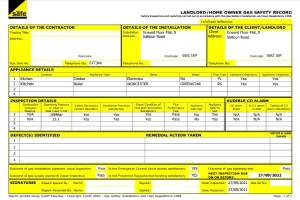What Safety Certificates Do Landlords Need To Have in England?
If you own property in England, then you know that you will need to have certain certificates. These will enable you to rent your property. But which or what certificates do landlords need in England?
To answer this very question, we have written this article. We will discuss the six certificates to rent your property in England. To help you out even more, we will tell you how to get these certificates easily and without hassle.
Other than letting you rent your apartment, these safety certificates have additional benefits. And we will look into that as well.
What Certificates Do Landlords Need In England?
Being a landlord in England comes with certain responsibilities, and one crucial aspect is ensuring your property meets the necessary safety standards. Let’s dive into the essential certificates landlords need to secure for a smooth and lawful renting process.
Landlord Gas Safety Record

The Landlord Gas Safety Record is a must-have certificate for every landlord renting a property with gas appliances. This safety check ensures all gas fittings and appliances are in good working order. It’s not just a legal requirement; it’s a vital step in safeguarding your tenants from potential gas-related hazards.
Electric Installation Condition Report (EICR)
Understanding the certificates needed for landlords in England is crucial for responsible property management. The Electric Installation Condition Report (EICR) is an essential certificate in this lineup. It concentrates on your property’s electrical aspects, diligently checking for potential hazards or faults. EICRs are typically required every five years. They play a crucial role in maintaining a safe environment, effectively preventing electrical accidents, and ensuring the well-being of your tenants.
Portable Appliance Testing (PAT)
For landlords figuring out the certificates needed in England, Portable Appliance Testing (PAT) is noteworthy. It includes a thorough check of electrical appliance safety, though not legally required. PAT is a proactive step for tenant safety, preventing potential electrical issues. Regular PAT testing identifies faulty appliances before they become hazardous.
Energy Performance Certificate (EPC)
Addressing the question of what certificates do landlords need in England, the Energy Performance Certificate (EPC) takes center stage. This certificate revolves around energy efficiency. It rates your property on a scale from A to G to indicate its energy efficiency level. The EPC contributes to reducing environmental impact. It also provides tenants with potential energy cost information associated with the property.
Legionella Risk Assessment
Legionella is a bacterium that can cause Legionnaires’ disease, a potentially fatal form of pneumonia. Landlords must conduct a Legionella Risk Assessment to locate and assess the risk of exposure to legionella bacteria in their properties. While not required annually, it’s a crucial step to ensure the safety of the water systems.
Houses in Multiple Occupation (HMO)
You’ll need a specific license if your property is categorized as an HMO. HMOs are properties where at least three tenants live, forming more than one household. They share amenities like bathrooms or kitchens. This license ensures the property meets the necessary safety and amenity standards for many occupants.
In a nutshell, ensuring your property has the required certificates is not just about following the law. It’s about prioritizing the safety and well-being of your tenants. Regular checks and assessments create a secure living environment. Also, it fosters a positive landlord-tenant relationship.
How Do You Get These Safety Certificates in England?
Obtaining safety certificates in England for your rental property is a straightforward process. It ensures you meet the regulations and put the well-being of your tenants above profit. Here’s a simple guide on how to get these essential safety certificates:
Landlord Gas Safety Record
Hire a Gas Safe registered engineer to inspect and certify your gas appliances annually. They’ll provide you with a Landlord Gas Safety Record after ensuring everything is in good working order.
Electric Installation Condition Report (EICR)
Contact a qualified electrician to conduct an EICR every five years or at the start of a new tenancy. They’ll thoroughly check your property’s electrical installations, highlighting potential hazards or faults.
Portable Appliance Testing (PAT)
While not a legal rule, consider hiring a PAT testing professional to assess the safety of the electrical appliances you provide. Regular testing can identify faulty appliances and prevent potential hazards.
Energy Performance Certificate (EPC)
Hire an accredited Domestic Energy Assessor to assess your property’s energy efficiency. They’ll provide you with an EPC rating from A to G, indicating how energy-efficient your property is.
Legionella Risk Assessment
If you’re confident, you can conduct a Legionella Risk Assessment or hire a specialist for a more thorough inspection. Ensure your water systems are safe and bacteria-free to protect your tenants.
Houses in Multiple Occupation (HMO) License
If your property falls under the HMO category, apply for a license from your local council. Ensure your property meets the necessary safety and amenity standards for multiple occupants.
Benefits of Having These Safety Certificates in England
In England, understanding what certificates do landlords need is crucial. It’s essential for responsible property management. These certifications ensure the safety and well-being of tenants. Landlords need to be well-versed in the requirements.
Tenant Safety Assurance
What certificates do landlords need in England for tenant safety assurance? The Gas Safety Record and EICR play a pivotal role. These certificates ensure that your property’s essential systems are safe, contributing directly to your tenants’ well-being.
Legal Compliance
By obtaining the required safety certificates, you comply with the law. This protects you from legal consequences and builds trust with your tenants. You show them that you focus on their safety and adhere to regulations.
Preventing Accidents
Regular checks through certificates like PAT and EICR help identify potential hazards. It also helps to stop them before they turn into accidents. This proactive approach prevents electrical mishaps. This ensures the safety of your property.
Energy Efficiency and Cost Savings
The Energy Performance Certificate (EPC) assesses energy efficiency and recommends improvements. Implementing these suggestions can lead to cost savings on energy bills for both you and your tenants.
Avoiding Health Risks
Certificates like the Legionella Risk Assessment help identify and address potential health risks. This ensures that your property’s water systems are free from bacteria, preventing illnesses and maintaining the health of your tenants.
Positive Landlord Image
Consider what certificates do landlords need in England to build a positive image. Demonstrating commitment to safety through these certificates enhances your reputation. This will attract quality tenants and foster a long-lasting landlord-tenant relationship.
Smooth Rental Process
Have you ever wondered what certificates do landlords need in England for a smooth rental process? Having all necessary certificates to streamline transactions. Tenants will likely be more confident knowing the property has documented safety checks.
Further Readings: A Step-by-Step Guide to Completing Lighting Certificate
Conclusion
You now have an idea about what certificates do landlords need in England. We only discussed the six most crucial safety certificates you need to rent your apartment in England. You might need other ones, depending on where your apartment is in England.
You will need to follow different steps before getting each certificate. With help from professional safety certificate services, the process can be very easy. Once you get them, you can enjoy all kinds of benefits, such as cost savings and a smoother renting process.
FAQs
Do I need all these certificates for every property I own?
Yes, each certificate serves a unique purpose, and compliance is necessary for every property you rent out.
What happens if I forget to renew a certificate on time?
Forgetting to renew certificates on time can lead to legal consequences, including fines and property rent restrictions.
Are there any exemptions for certain types of properties?
While some exemptions exist, it’s essential to understand the specific requirements for each property type and comply accordingly.
Can I perform the checks and inspections myself?
Typically, most certificates require certified professionals to ensure accurate and thorough assessments.
Where can I find the latest regulations for landlords in England?
You can check the government website or talk to a legal expert about property and landlord-tenant laws.

